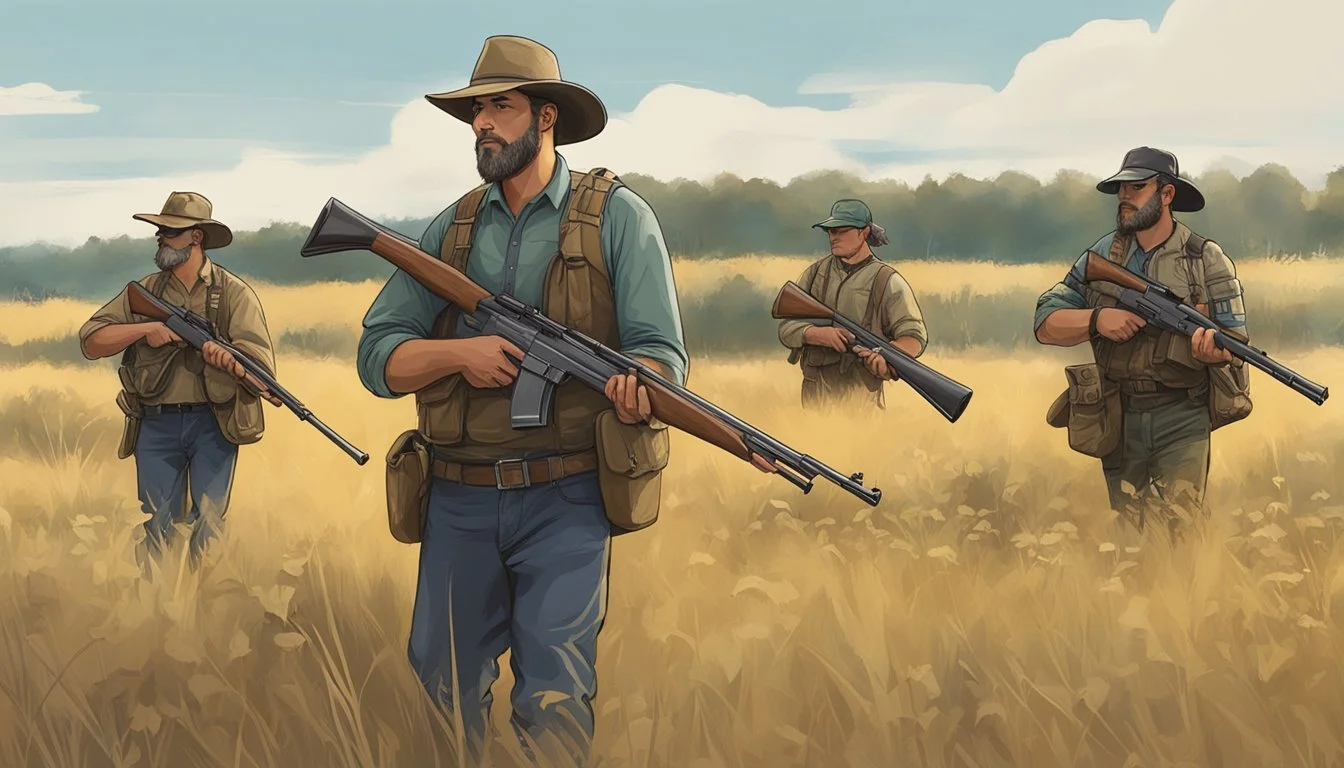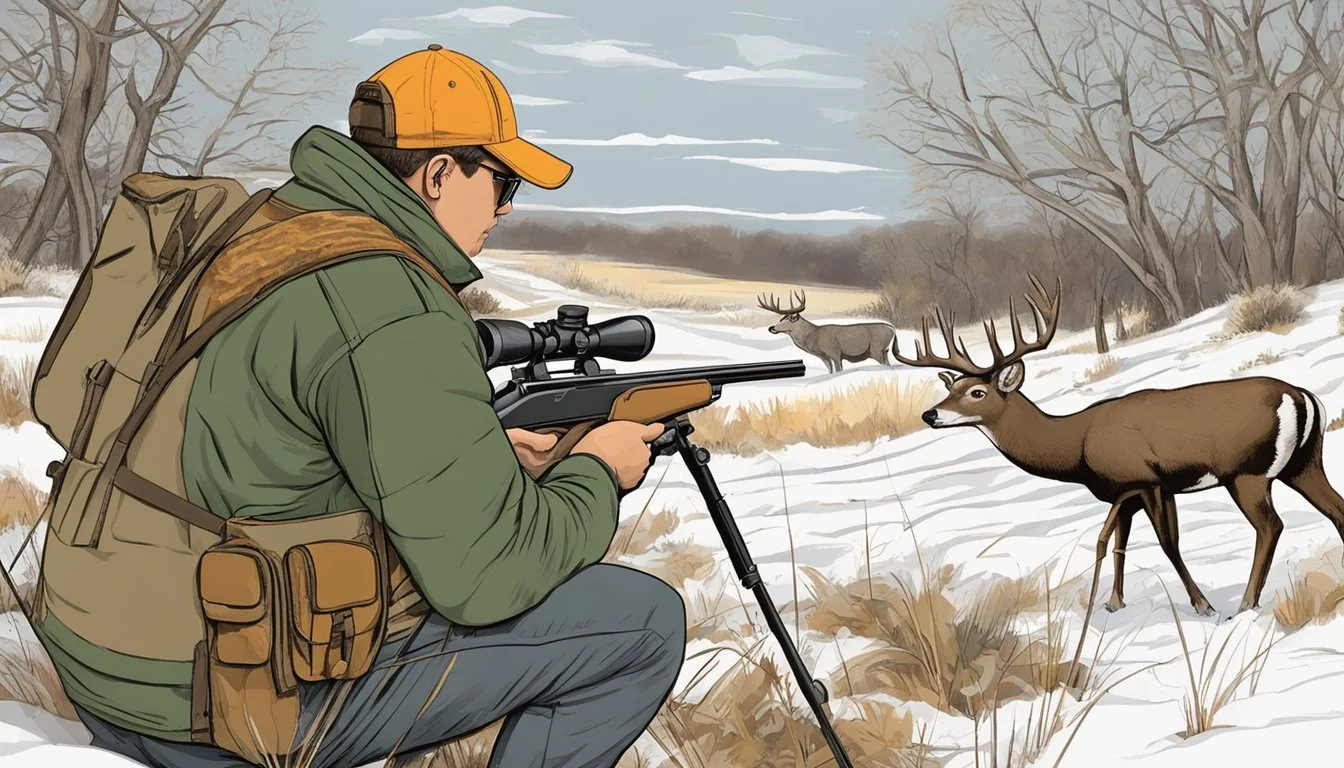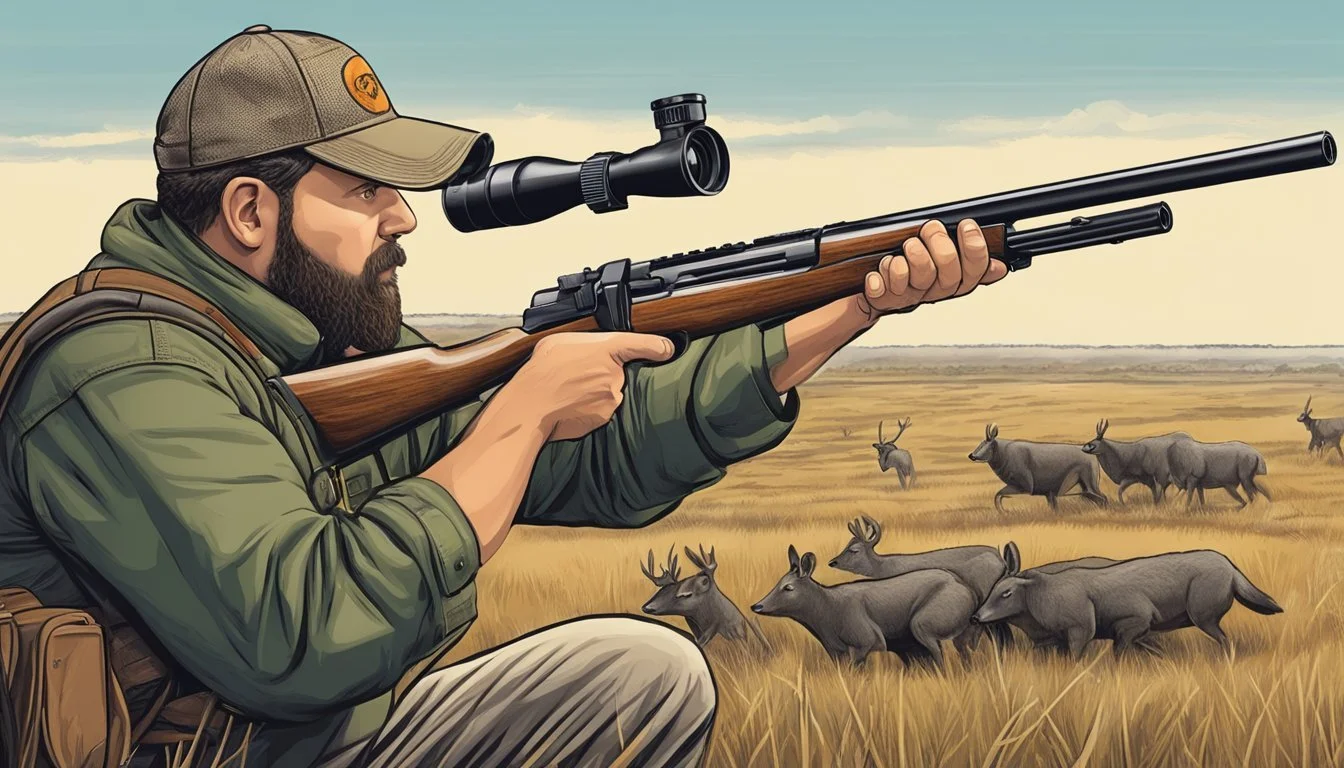Gun Laws in Kansas for Hunters
Understanding Regulations and Requirements
Kansas gun laws offer a relatively permissive framework for hunters and firearms enthusiasts. Under state constitution provisions, residents have the right to bear arms for defense and security. Specifically related to hunting, the state does not require background checks or permits to carry concealed firearms, including while hunting, fishing, or furharvesting. This provides hunters with fewer legal hurdles when engaging in such activities compared to some other states.
Recent legislative changes have further eased the way for firearms to be carried in public places. These laws are significant for hunters as they navigate exactly what is permissible when transporting and using firearms in the pursuit of game. It is essential for hunters to understand that, despite these relaxed laws, they must still observe federal regulations and any specific to wildlife areas or hunting seasons.
Despite the permissiveness of Kansas gun regulations, there are still important restrictions. Selling, transferring, or providing firearms to felons is prohibited, as is the possession of weapons by those previously convicted of a felony. Therefore, hunters must be clear on their eligibility to possess firearms before partaking in any hunting activity. Adhering to both state and federal laws ensures the safety and legality of hunting practices within Kansas.
Understanding Kansas Gun Laws
Kansas gun laws provide a specific framework for the acquisition, possession, and carry of firearms within the state. Understanding these regulations is crucial for hunters and all gun owners to ensure responsible and legal handling of firearms.
Overview of State Permit Requirements
In Kansas, residents do not require a permit to purchase firearms. This includes both handguns and long guns. Minors under 18 can possess firearms only under the supervision of a parent, legal guardian, or qualified instructor, and when engaging in lawful activities such as hunting or competitive shooting.
Open Carry and Concealed Carry Regulations
Open Carry is permitted in Kansas for individuals who are 18 years or older and legally allowed to own a firearm. As for Concealed Carry, Kansas allows individuals who are 21 years old and above and lawfully permitted to possess a firearm to conceal carry without a permit in the state.
Kansas Law and Federal Requirements
While Kansas law facilitates the ownership and carry of firearms, it also complies with federal requirements. Federal law, for instance, mandates background checks from licensed dealers for all firearm purchases, which Kansas adheres to. Additionally, federal age restrictions require individuals to be at least 18 years old to purchase long guns and 21 years old for handguns from licensed dealers.
Licensing Processes and Background Checks
Kansas repealed the law requiring a permit and background check to conceal carry a firearm in the state. However, those who choose to apply for a Concealed Carry License will go through a background check process. For those purchasing firearms from a licensed dealer, a federal background check is still necessary.
This section breaks down the key components of gun laws in Kansas relevant to hunters and gun enthusiasts, covering state permit requirements, carry regulations, as well as state and federal laws regarding licensing and background checks.
Acquiring Firearms in Kansas
In Kansas, acquiring firearms is a process governed by state and federal laws that potential buyers and owners must carefully adhere to. Specific criteria for purchase, ownership, and the legality of private sales are laid out to ensure proper transfer and possession of firearms.
Purchase and Ownership Criteria
Kansas residents wishing to purchase a firearm must satisfy both federal and state requirements. Under federal law, buyers must undergo a background check when purchasing from a licensed dealer. This check screens for any criminal record, domestic violence incidents, or records that would disqualify an individual such as a felony conviction. State regulations do not mandate a background check for private sales, although federal laws still apply.
Private Sales and Background Check Exemptions
While Kansas does not require background checks for private sales, federal regulations necessitate checks for sales through licensed firearm dealers. In private transactions, it remains the responsibility of the buyer and seller to ensure that the sale complies with all laws. Buyers and sellers are advised to perform due diligence to avoid transferring a firearm to someone legally prohibited from owning one.
Age Restrictions and Legal Eligibility
To purchase a long gun from a licensed dealer, individuals must be at least 18 years of age and provide appropriate identification. For handguns, buyers need to be 21 years of age. One must not be a convicted felon unless their rights have been expunged or pardoned to legally own a firearm. Kansas emphasizes the importance of adhering to legal age limits and ensuring buyers do not have disqualifying criminal histories.
Hunting Laws and Firearm Use
In Kansas, hunters need to navigate a set of clearly defined regulations for firearm use during hunting seasons. These laws ensure safety and conservation while catering to the requirements for different game species.
General Hunting Regulations in Kansas
Kansas enforces comprehensive hunting regulations to manage wildlife populations and ensure ethical hunting practices. Hunters are required to adhere to specified hunting seasons for various game, including deer, turkey, duck, and small game. The use of rifles and shotguns for hunting is permitted under state law, provided they are not fully automatic. Ammunition used must conform to certain standards such as being hard-cast solid lead, soft point, hollow point, or other expanding types to ensure a quick and humane kill.
Specific Rules for Firearm Hunting
When hunting with firearms in Kansas, hunters must use legal firearms. These include:
Centerfire rifles
Handguns
Shotguns used for hunting birds must not be capable of holding more than three shells in the magazine and chamber combined. It's important to note that during the archery season, those with archery permits must only use archery equipment. If firearm and archery seasons overlap, the use of firearms is still reserved for those with the appropriate firearm-specific tags.
Hunting License Requirements and Tags
All hunters in Kansas are required to obtain a proper hunting license and the necessary tags for the specific game they intend to hunt. The licensing process includes verifying that the applicant has completed a hunter education course, which is mandatory for any hunter born on or after July 1, 1957. Here's an overview of license types for different game:
Deer Hunting: Requires a deer tag along with a hunting license.
Turkey Hunting: Specific turkey tags are necessary depending on the season.
Duck Hunting: In addition to a hunting license, a Federal Duck Stamp and State Waterfowl Stamp are generally required.
Elk Hunting: An elk tag is required, which is typically obtained through a lottery due to limited availability.
Small Game Hunting: A general hunting license is sufficient for species such as rabbits and squirrels.
Hunters should be vigilant in maintaining the correct documentation and adhere to the bag and possession limits specific to the game they are hunting. Failure to comply with these regulations can result in significant legal consequences.
Always consult the latest Kansas Department of Wildlife, Parks, and Tourism (KDWP) regulations or contact the department's Law Enforcement Division for the most current and detailed information.
Safety and Education
For hunters in Kansas, understanding and adhering to safety protocols and education requirements is paramount. These measures ensure the well-being of hunters and the sustainability of wildlife populations.
Firearms Safety Courses
The state of Kansas mandates that individuals handling firearms for hunting purposes complete a firearms safety course. Engaging in these courses helps to minimize accidents and encourage responsible gun handling. Kansas residents have the option to enroll in NRA-sponsored free courses, which cater to anyone over the age of 11 and are provided at no cost to residents 16 and over.
Online Availability: The NRA offers an Internet-Assisted Course for flexibility.
Proof of Certification: Individuals aged 27 or younger must carry certification proof during hunting activities.
These educational initiatives are supported by partnerships between the NRA, the Kansas Department of Wildlife and Parks, and Kansas Hunter Education.
Hunter Education Programs
Every hunter in Kansas born on or after July 1, 1957, is required to be certified in hunter education. The Hunter Education Program's core focus is on safety and conservation, topics crucial for both new and experienced hunters.
Age Requirement: Hunter education is accessible to individuals age 11 and older.
Supervision: Until the age of 27, hunters must have hunter education certification on them while hunting.
Legal Guardian or Grandparent: A person under the age of 27 may hunt without proof of hunter education if accompanied by a legal guardian or grandparent who is certified.
The Kansas Department of Wildlife, Parks, and Tourism offers classes statewide, presenting various formats and schedules to accommodate the needs of all interested individuals.
Legal Considerations and Enforcement
In Kansas, hunters must adhere to specific statutes regarding the carrying and use of firearms. These laws focus on ensuring public safety without infringing on individual rights. Hunters are advised to be familiar with these regulations to avoid legal infractions.
Carrying Firearms in Public Places
Kansas law allows individuals to carry firearms in public. However, specific locations such as schools, courthouses, and anywhere metal detectors are present generally prohibit carrying firearms. Hunters must be aware that carrying a weapon in these areas can lead to legal consequences. Transporting firearms in a vehicle is also permitted, provided the gun complies with the state's regulations.
Defense Laws: Castle Doctrine and Stand Your Ground
Kansas adheres to both the Castle Doctrine and Stand Your Ground laws. These laws permit individuals to use force, including deadly force, in defense of themselves or other innocent parties. The Castle Doctrine specifically allows for such actions within one's home, while Stand Your Ground removes the duty to retreat before using force if they lawfully occupy a location.
Interactions with Law Enforcement
When interacting with law enforcement officers, hunters must disclose the presence of firearms. Compliance and clear communication during these interactions promote public safety and prevent misunderstandings that could lead to a criminal offense.
Prohibited Activities and Penalties
Kansas enforces several prohibitions affecting hunters and firearm carriers:
It is unlawful to use firearms while under the influence of alcohol or drugs.
Discharging firearms from or across roadways can result in penalties.
Poor conduct with a firearm, such as brandishing or using it in a threatening manner unless in defense, is considered a serious crime.
Hunters found in violation of these laws may face fines, community service, or even imprisonment, depending on the severity of the offense.
Special Programs and Considerations
The state of Kansas offers various specialized programs to support disabled hunters and to promote youth engagement through mentorship initiatives designed to foster hunting traditions.
Programs for Disabled Hunters
Kansas recognizes the importance of accessibility in hunting for individuals with disabilities. The Kansas Department of Wildlife & Parks (KDWP) partners with organizations like Kansas Sportsmen Assisting Disabled Sportsmen (KSADS) to ensure that hunting remains an inclusive activity. KSADS and similar programs facilitate adapted hunting experiences, providing assistance with obtaining necessary permits and employing modified equipment which is designed to meet the unique needs of disabled sportsmen and sportswomen.
Youth and Mentorship Initiatives
Youth engagement is critical for the continuation of hunting traditions. Kansas has implemented youth and mentorship programs aimed at educating and introducing young people to the sport. Individuals under the age of 16 may hunt without a hunter education certification if accompanied by a mentor. Authorized mentorship programs like the Hunter Referral Program create opportunities for experienced hunters to pass on their knowledge. Furthermore, eligible residents can obtain a Resident Hunting License at a reduced cost for youth applicants, incentivizing participation among the younger demographic.
Ownership Extensions and Limitations
Kansas gun laws offer a degree of freedom for firearm owners while also imposing certain limitations to promote safety and legal compliance among hunters.
Concealed Carry Permits and Reciprocity
In Kansas, individuals aged 21 and older are entitled to carry concealed firearms without a permit, including on college campuses, provided metal detectors and security personnel are not in place. The state also recognizes concealed carry permits issued by other jurisdictions, affording a broad level of reciprocity for out-of-state individuals.
Lifetime Licenses and Renewals
Kansas does not currently offer lifetime licenses for hunting or concealed carry. Hunters and concealed carry permit holders must adhere to the regular renewal processes. Permits are time-bound, with the need for renewals set by the state's regulations.
Restrictions on Firearm Types and Modifications
Kansas hunters should be aware of restrictions and legal boundaries regarding firearm types and modifications. All firearms, including popular models like the AR-15, must comply with federal regulations. The state prohibits certain modifications; for instance, a barrel less than 12 inches is illegal and classified as a short-barreled rifle subject to regulation. Additionally, possession of a firearm while under the influence of a controlled substance is unlawful, as is providing firearms to juvenile offenders or felons.
Conservation and Wildlife Management
In Kansas, hunting is a vital tool for managing wildlife populations and supporting conservation efforts. The state implements structured hunting seasons and programs that synchronize with the objectives of sustaining and nurturing diverse ecosystems.
Role of Hunting in Wildlife Population Control
In maintaining ecological balance, Kansas designates specific hunting seasons for game animals like deer and turkey. Hunting plays a crucial role in controlling wildlife populations to prevent overpopulation and resource depletion. Regulated seasons and legal equipment guidelines ensure ethical practices are followed. Archery, for instance, is a permitted method, with defined seasons typically running from September through December for deer.
Deer Hunting Seasons with Archery in Kansas:
Statewide: September 12 - December 31
Extended Season (certain areas): Dates vary
These management decisions are informed by scientific research and population data to ensure they effectively contribute to the conservation goals.
Conservation Programs and Seasonal Hunting Schedules
Kansas's conservation programs, such as the Walk-In Access Hunting Program, provide expanded hunting opportunities while promoting habitat conservation. This program enables public access to private land, enhancing wildlife habitats and offering additional areas for hunters to pursue game. Seasonal hunting schedules are tailored to align with conservation needs, ensuring hunting activities support the overall health and diversity of ecosystems.
Key Seasonal Hunting Periods for Game Animals in Kansas:
Turkey: Spring and Fall seasons, with dates varying annually
Deer: Different methods including Archery, Firearm, and Muzzleloader with varied season dates
Through these initiatives, Kansas actively fosters an environment where both wildlife management and sportsmanship can coexist for the benefit of natural resources and hunting heritage.
Additional Resources and Organizations
Kansas provides a range of additional resources and organizations dedicated to supporting gun owners' rights, education, and community engagement. These entities offer guidance to hunters regarding legal defense, safety, and responsible hunting practices.
Second Amendment Advocacy and Legal Defense Funds
In Kansas, hunters and gun owners have access to organizations such as the National Rifle Association (NRA), which actively advocates for Second Amendment rights. The NRA also provides legal defense funds for members facing legal challenges related to their firearm use and ownership.
NRA: Offers legal advocacy and educational programs.
Legal Defense: Provides support through funding and legal resources.
Educational Resources and Community Engagement
Kansas Department of Wildlife, Parks, and Tourism (KDWP) provides educational resources for hunters, including a comprehensive hunting guide that details regulations for each season. Community engagement is encouraged through hunter education courses where individuals can learn about responsible hunting, safety, and conservation efforts.
KDWP Hunting Guide: Essential for understanding state-specific hunting laws.
Educational Courses: Mandatory for hunters born on or after July 1, 1957, unless exempt.
By participating in educational programs and engaging with these resources, Kansas hunters can stay informed about their rights and responsibilities, ensuring a safe and legal hunting experience.








